 December 9, 2021 John E. Ross, KD8IDJ, Editor
| ||||||
Senator Blumenthal Supports Amateur Radio at Senate Confirmation Hearing Senator Richard Blumenthal (CT) received an affirmative reply from FCC Chairwoman Jessica Rosenworcel when he asked her to commit to providing his office "an update on the steps that the FCC is taking to support amateur radio operators." The Senator posed the written
question as part of Rosenworcel's renomination hearing conducted by the Senate Commerce, Science, and Transportation Committee. Blumenthal noted specifically that "Radio amateurs voluntarily provide an array of public services, especially emergency and disaster-related support communications when infrastructure has been destroyed by a hurricane or similar disaster. Their contributions in this area are regularly recognized by local and state authorities." "ARRL is grateful to Senator Blumenthal for his support and recognition of radio amateurs," said ARRL President Rick Roderick, K5UR. Blumenthal has previously co-sponsored legislation supporting amateur radio, and his staff was recently briefed by ARRL on pending amateur radio matters at the FCC. Roderick added, "We need the partnership of the FCC and Congress to ensure our rules and spectrum continue to support the march of technological innovation in our vibrant Amateur Radio Service." Multiple proceedings to update or change the FCC's Amateur Radio Service Part 97 rules to account for changes in technology and operating practices have been languishing at the FCC, some going back five or more years. ARRL is hopeful that these will be addressed soon. Senate Confirms FCC Chairwoman Jessica Rosenworcel for a New Term On December 7, the US Senate confirmed FCC Chairwoman Jessica Rosenworcel for a new term on the Commission with a vote of 68 - 31. President Joe Biden appointed Rosenworcel as Chair of the FCC in late October. For now, the FCC will continue with two Democrats and two Republicans led by Chairwoman Rosenworcel.
The nomination of a fifth commissioner remains pending before the Senate. Last week, the Senate Commerce, Science, and Transportation Committee conducted a hearing on President Biden's nominee, Gigi Sohn, for the remaining Democratic seat. Committee and full Senate votes on her nomination have not yet been scheduled. -- Thanks to ARRL Public Relations and Innovation Projects Manager Bob Inderbitzen, NQ1R ARRL Executive Committee Meets The ARRL Executive Committee met on October 25 in virtual session, with President Rick Roderick, K5UR, presiding. In his report, CEO David Minster, NA2AA, noted that the revised ARRL Articles of Incorporation approved during the July 2021 Board meeting had been filed with the State of Connecticut. He also discussed the delayed timing of the delivery of the December issue of QST. He advised that Members should expect to receive their December issue CEO Minster reported he had met with ARRL Field Services Manager Mike Walters, W8ZY, on October 22 at Bradley International Airport near Hartford, Connecticut, to observe ARRL participation in an emergency management exercise that concluded on October 23. Walters, on behalf of ARRL, participated in all 3 days of the exercise. ARRL FCC Counsel David Siddall, K3ZJ, discussed recent efforts at the FCC and on Capitol Hill advocating FCC action on long-pending proceedings that address Amateur Radio concerns. Siddall also addressed new legislation pending before Congress that would set deadlines for the allocation of additional spectrum below 3.45 GHz to commercial 5G providers. He described ARRL's efforts to obtain support for allowing continued sharing below 3.45 GHz on a non-interference basis. FCC Counsel Siddall noted an FCC Notice of Proposed Rulemaking (PS Docket 21-346) looking into ways of improving communications resiliency and recovery during hurricanes and other disasters. He said ARRL had submitted reports to FCC staff during and immediately following Hurricane Ida. Siddall further noted the progress of the ARRL RF Safety Committee in addressing and clarifying issues concerning amateur compliance with FCC RF exposure rules and appropriate updates to the related FCC bulletin. He concluded that the work of the Committee, under the leadership of Greg Lapin, N9GL, will benefit every amateur in the future to more readily assess RF exposure compliance and to make any adjustments needed. West Gulf Division Director, EC member, and Chairman of the Legislative Advocacy Committee, John Robert Stratton, N5AUS, updated the EC on the status of a resolution introduced in Congress by US Representative Debbie Lesko of Arizona to declare April 18, 2022 as National Amateur Radio Operators Day. Director Stratton also advised the EC that the Legal Structure Review Committee was reviewing the Articles of Association, By-Laws, and Standing Orders with an eye toward recommending any needed changes at the January 2022 Board meeting. The Executive Committee meets again on December 13. ARRL Podcasts Schedule
The latest edition of Eclectic Tech (Episode 48) of the Eclectic Tech podcast features a conversation The On the Air and Eclectic Tech podcasts are sponsored by Icom. Both podcasts are available on iTunes (iOS) and Stitcher (Android) as well as on Blubrry -- On the Air | Eclectic Tech. ARDC Grant Will Expand RMHAM's 5 GHz Microwave Network in the Rockies A grant of $374,233 from Amateur Radio Digital Communications (ARDC) to Rocky Mountain Ham Radio (RMHAM) will go toward expanding a multistate 5 GHz microwave network and help to outfit The microwave network enables partnering amateur radio clubs and groups to access, enable, or expand their repeater and other FCC Part 97-appropriate applications. The network provides 50 - 100+ Mbps of bandwidth and is managed and monitored by a dedicated network operations team. In Colorado, RMHAM will be able to grow its microwave network by 23 new microwave sites and 20 new point-to-point spans to expand IP connectivity and future repeater coverage across the western slope of Colorado and along the I-70 and I-76 corridors in eastern Colorado. In New Mexico, RMHAM will grow its microwave network by 16 sites and 15 new point-to-point spans to expand IP connectivity and
future repeater coverage south from Albuquerque to El Paso, Texas; along US Route 550 to Durango, Colorado, and across the Rio Grande Valley to Alamogordo, New Mexico. The club will also expand RMHAM digital repeater coverage (DMR or D-STAR, depending on coverage gaps) across New Mexico through the addition of seven repeaters co-located at their proposed new microwave sites. As a result of the grant, RMHAM will also be able to upgrade its Colorado communications trailer, which offers both RF and IP connectivity, and to outfit a new trailer for service in New Mexico. ARRL Learning Network Webinars Visit the ARRL Learning Network (a members-only benefit) to register, check on upcoming webinars, and to view previously recorded Have an interesting topic you want to share? The ARRL Learning Network is a series of online webinars presented by member-volunteers for members. Presentations should be short -- 30 minutes plus an additional 15-minutes for Q&A. Submission topics should be of interest to a broad audience of hams, particularly those either new to amateur radio or experienced hams looking to learn about a new way to get involved! Selected presenters will be contacted and invited to schedule their webinar from a list of upcoming available date/time slots. An ARRL staff member will help coordinate the details with you, so you'll be ready for your presentation day. For more information, email ARRL Education and Learning. ARRL members may register for upcoming presentations and view previously recorded Learning Network webinars. ARRL-affiliated radio clubs may also use the recordings as presentations for club meetings, mentoring new and current hams, and discussing amateur radio topics. The ARRL Learning Network schedule is subject to change. November 2021 Volunteer Monitor Program Report This is the November 2021 report of Volunteer Monitor (VM) Program activity. The VM program is a joint initiative between ARRL and the FCC to enhance compliance in the Amateur Radio Service.
Totals for VM monitoring during October were 2,939 hours on HF frequencies, and 3,282 hours on VHF frequencies and above, for a total of 6,221 hours. That is the highest number of hours monitoring since the inception of the VM Program. -- Thanks to Volunteer Monitor Program Administrator Riley Hollingsworth, K4ZDH Amateur Radio in the News ARRL Public Information Officers, Coordinators, and many other member-volunteers help keep amateur radio and ARRL in the news.
Share any amateur radio media hits you spot with us. Replica Transmitter will be On the Air to Mark Transatlantic Test Success A replica 1BCG transmitter will operate as W2AN/1BCG on ±1.820 MHz on CW, from The Vintage Radio and Communications Museum of Connecticut.
"We're using type 204-A tubes," said Mark Erdle, AE2EA, of the Antique Wireless Association. "The original transmitter used type 204 tubes. The primary difference is that the 204-A tubes had a thoriated filament that reduced the filament current. Transmissions from W2AN/1BCG will be one way, just like the original transatlantic tests in 1921. An SWL certificate is available by emailing a copy of the transmitted message. Transmissions start on December 11 at 2300 UTC continuing every 15 minutes until December 12 at 0400 UTC. In a separate event on December 12 at 0252 UTC, The Radio Club of America's W2RCA will make a one-way transmission on 1825 kHz at 12 WPM CW, from Connecticut. RCA members constructed the original transmitter and "shack" used in Connecticut for the successful transatlantic transmissions. In addition to the original 1921 message, a new message will be transmitted that looks ahead to the next 100 years. Those who copy the message qualify for a certificate. -- Thanks to Mark Erdle, AE2EA, Antique Wireless Association, and to the Radio Club of America ARRL and the Radio Society of Great Britain (RSGB) have assembled a list of stations and groups that are organizing events and activities to celebrate 100 years of amateur radio transatlantic communication. Visit http://www.arrl.org/transatlantic and https://rsgb.org/transatlantic-tests. The sites also include links to many previously published articles and presentations covering the historic tests. Announcements
ARRL Seeks News Editor ARRL is seeking a ham with a professional journalism background to handle ARRL's news function on a contract, remote basis. Candidates for ARRL News Editor should be plugged into the ham radio community, with a broad awareness of the major players (past and present) and the main issues (past, present, and potentially future) in the world of ham radio. Ideally, candidates will have professional The News Editor creates news stories that are posted on ARRL's home page, and is responsible for publishing the weekly e-newsletter, The ARRL Letter, which is populated mainly by those stories and augmented by some special weekly material (a solar weather report, a contest calendar, a conventions calendar, etc.). The News Editor is also responsible for creating the ARRL Audio News, a weekly audio show that presents stories from the home page and The ARRL Letter, and assembles the most relevant stories from ARRL home page into QST's monthly "Happenings" column. For more information, contact ARRL Publications & Editorial Manager Becky Schoenfeld, W1BXY. World's Smallest Moon Lander from Japan will Put Ham Radio Transmitter on the Moon Japan's OMOTENASHI, the world's smallest moon lander, will have an X-band and UHF communication system, although it will not carry an amateur band transponder. OMOTENASHI is a 6U CubeSat set for launch via a NASA SLS rocket as early as February 2022. It will have a mission period of from 4 to 5 days. The name is an acronym for Outstanding Moon Exploration Technologies demonstrated by Nano
Semi-Hard Impactor. Wataru Torii of the Japan Aerospace Exploration Agency (JAXA) Ham Radio Club, JQ1ZVI, said radio amateurs can play a role in gathering data from the spacecraft. The spacecraft is made up of two separable components, both having independent communication systems -- an orbiting module and a surface probe. The orbiting module will take the surface probe to the moon. It will transmit beacon or digital telemetry data on UHF (437.31 MHz). The surface probe -- the moon lander -- will transmit digital telemetry or three-axis acceleration analog-wave with FM modulation on UHF (437.41 MHz). Transmitter power will be 1 W in both cases. "If we succeed in receiving the UHF signal from the surface probe, we could know the acceleration data on the impact on the moon and the success of the landing sequence," Torii explained. "We already have a station for uplink and downlink at Wakayama in Japan -- used as an EME [moonbounce] station. However, if the satellite is invisible from Japan, we cannot receive the downlink signal. So, we need a lot of help from ham radio stations worldwide." The orbiting module beacon will transmit on 437.31 MHz using PSK31. The surface probe beacon will transmit on 437.41 MHz using FM, PSK31, and PCM-PSK/PM. Contact Torii for more information. WSJT-X Development Group Partner Bill Somerville, G4WJS, SK A key member of the WSJT-X Development Group -- where FT8 and other cutting-edge digital amateur radio technology has originated -- has died. Bill Somerville, G4WJS, was reported to have passed away earlier this week. He was in his mid-60s, and his death was unexpected. The development group founder, Joe Taylor, K1JT, called Somerville "a dear friend and very close colleague." Taylor said that
Somerville was the first to join with him in 2013 to form a core development group for WSJT-X, then in its digital infancy. "Bill has been closely involved with WSJT-X and related software projects ever since," Taylor said. "Our free, open-source software could not have achieved its extensive worldwide popularity and influence in ham radio without Bill's essential contributions." Somerville collaborated with Taylor and Steve Franke, K9AN -- the third member of the WSJT-X development group -- to author articles for QST and QEX about FT8 and other digital modes in the WSJT-X suite. The trio won the October 2017 QST Cover Plaque Award. They also received the Dayton Hamvention® Technical Achievement Award in 2020, and the ARRL Doug DeMaw, W1FB, Technical Excellence Award in 2021. Taylor said Somerville "devoted countless hours to program support, patiently answering user's questions on WSJT-related forums." "I have only started to think about the many ways in which I will miss Bill -- not [to] mention how we all will miss his immense and positive impact on WSJT-X and related projects," Taylor said. Professionally, Somerville was a software engineer who worked mainly as a C++ system software developer, as he explained on his QRZ profile. As an active radio amateur, he also applied his expertise to such projects as setting up an SO2R (single operator, two radio) station and enhancing his station's automated processes. In Brief...
The K7RA Solar Update Tad Cook, K7RA, Seattle, reports: One new sunspot group appeared on December 4, but 4 days later it was gone. Average daily sunspot number declined from 46.1 to 24.6, and no sunspots were visible on December 8. Average daily solar flux went from 90.9 to 82.6. Predicted solar flux over the next month does not seem promising. The December 8 forecast shows 78 and 80 on December 9 - 10; 82 on December 11 - 16; 85 on December 17 - 18; 87 on December 19 - Predicted planetary A index is 5, 10, 8, and 5 on December 9 - 12; 8 on December 13 - 14; 5 on December 15 - 16; 15, 12, 10, and 8 on December 17 - 20; 5 on December 21 - 26; 15, 18, and 12 on December 27 - 29; 8 on December 30 - January 3; 5 on January 4 - 5; 10, 8, 5, 12, and 10 on January 6 - 10; 5 on January 11 - 12, and 15, 12, 10, and 8 on January 13 - 16. Sunspot numbers for December 2 - 8 were 45, 29, 35, 36, 14, 13, and 0, with a mean of 24.6. The 10.7-centimeter flux was 86.6, 85.3, 88.1, 82.7, 80, 78.9, and 76.9, with a mean of 82.6. Estimated planetary A indices were 10, 8, 9, 9, 7, 5, and 5, with a mean of 7.6. Middle latitude A index was 7, 4, 7, 6, 6, 3, and 4, with a mean of 5.3. A comprehensive K7RA Solar Update is posted Fridays on the ARRL website. For more information concerning radio propagation, visit the ARRL Technical Information Service, read "What the Numbers Mean...," and check out the Propagation Page of Carl Luetzelschwab, K9LA A propagation bulletin archive is available. For customizable propagation charts, visit the VOACAP Online for Ham Radio website. Share your reports and observations. Just Ahead in Radiosport
Upcoming Section, State, and Division Conventions
Search the ARRL Hamfest and Convention Database to find events in your area. ARRL -- Your One-Stop Resource for
Subscribe to...
Free of charge to ARRL members...
| ||||||
.jpg)
.jpg) The chairwoman said in a
The chairwoman said in a .jpg) about a week late. Minster also said ARRL is expecting an increase in the price it pays for paper, effective in February 2022. He said it's not yet clear whether the impact of the increase in paper costs would be short- or long-term.
about a week late. Minster also said ARRL is expecting an increase in the price it pays for paper, effective in February 2022. He said it's not yet clear whether the impact of the increase in paper costs would be short- or long-term..jpg) The latest episode of the On the Air podcast (Episode 24) features tips about how to improve the effective range of your handheld transceiver.
The latest episode of the On the Air podcast (Episode 24) features tips about how to improve the effective range of your handheld transceiver..jpg) about the technical aspects of the 1921 Transatlantic Tests with Clark Burgard, N1BCG. We also chat about on-air activities surrounding the upcoming anniversary.
about the technical aspects of the 1921 Transatlantic Tests with Clark Burgard, N1BCG. We also chat about on-air activities surrounding the upcoming anniversary..jpg) communications trailers.
communications trailers.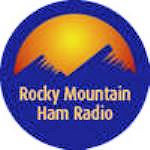
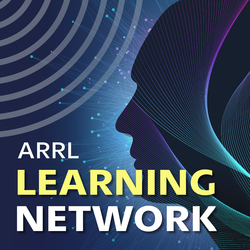 sessions.
sessions.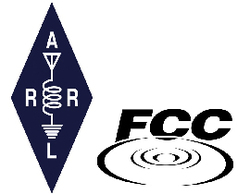 transmitting on SSB with bandwidths of 8 to 9 kHz.
transmitting on SSB with bandwidths of 8 to 9 kHz..jpg)
.jpg) The Hungarian Amateur Radio Association (
The Hungarian Amateur Radio Association ( The
The -from-website.JPG) journalism experience -- in particular, having a well-developed sense of knowing a potential news story when they see one, as well as how and where to research leads.
journalism experience -- in particular, having a well-developed sense of knowing a potential news story when they see one, as well as how and where to research leads.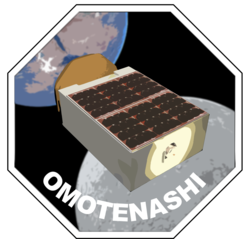
.png)
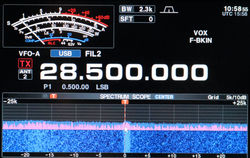 The
The .jpg) Virginia Section Manager Joe Palsa, K3WRY, of North Chesterfield, Virginia, died on December 7. An ARRL Life Member, he was 80. Palsa was appointed Virginia Section Manager in February 2015, and had since won elections in his own right. A radio amateur for more than 50 years, he also served as the Virginia State Government Liaison. Palsa held a PhD in electronics technology and was a Life Member of the Institute of Electrical and Electronics Engineers (IEEE). He enjoyed researching and designing ham equipment and building projects, including some specialized military applications on electromagnetic compatibility (EMC), electromagnetic interference (EMI), and electromagnetic pulse (EMP). During 2014, he served as president of the Richmond Amateur Radio Club. In past years, he has held ARRL Field Organization positions as Official Bulletin Station (OBS), Official Observer (OO), and Official Emergency Station (OES). Active in the Amateur Radio Emergency Service® (ARES®), he received two ARRL public service awards. Palsa enjoyed DXing, contesting, and public service communication.
Virginia Section Manager Joe Palsa, K3WRY, of North Chesterfield, Virginia, died on December 7. An ARRL Life Member, he was 80. Palsa was appointed Virginia Section Manager in February 2015, and had since won elections in his own right. A radio amateur for more than 50 years, he also served as the Virginia State Government Liaison. Palsa held a PhD in electronics technology and was a Life Member of the Institute of Electrical and Electronics Engineers (IEEE). He enjoyed researching and designing ham equipment and building projects, including some specialized military applications on electromagnetic compatibility (EMC), electromagnetic interference (EMI), and electromagnetic pulse (EMP). During 2014, he served as president of the Richmond Amateur Radio Club. In past years, he has held ARRL Field Organization positions as Official Bulletin Station (OBS), Official Observer (OO), and Official Emergency Station (OES). Active in the Amateur Radio Emergency Service® (ARES®), he received two ARRL public service awards. Palsa enjoyed DXing, contesting, and public service communication..jpg) 22; 86 on December 23 - 27; 84 on December 28; 82 on December 29 - January 2; 80 on January 3 - 5; 82 on January 6 - 8; 80 on January 9 - 10; 82 on January 11, and 85 on January 12 - 14.
22; 86 on December 23 - 27; 84 on December 28; 82 on December 29 - January 2; 80 on January 3 - 5; 82 on January 6 - 8; 80 on January 9 - 10; 82 on January 11, and 85 on January 12 - 14.







